人教版(2019)必修 第一册Unit 4 Natural disasters课文详解课件(共106张PPT)
文档属性
| 名称 | 人教版(2019)必修 第一册Unit 4 Natural disasters课文详解课件(共106张PPT) |  | |
| 格式 | zip | ||
| 文件大小 | 47.2MB | ||
| 资源类型 | 教案 | ||
| 版本资源 | 人教版(2019) | ||
| 科目 | 英语 | ||
| 更新时间 | 2023-02-25 22:49:39 | ||
图片预览

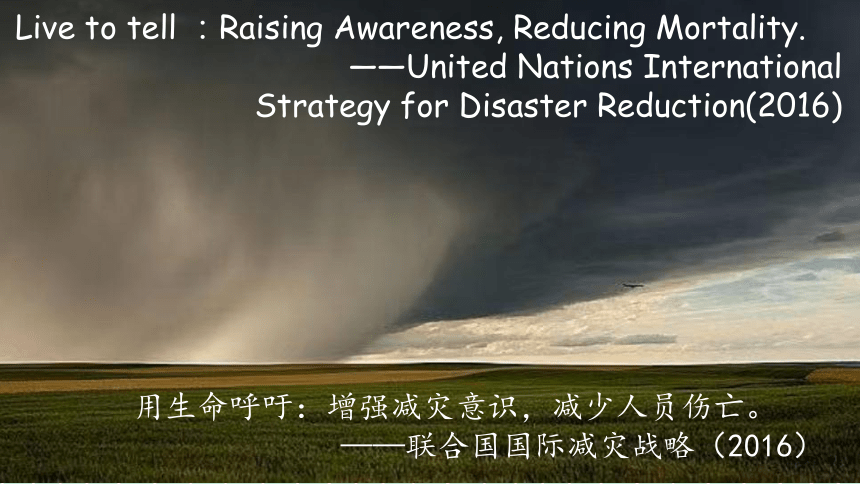


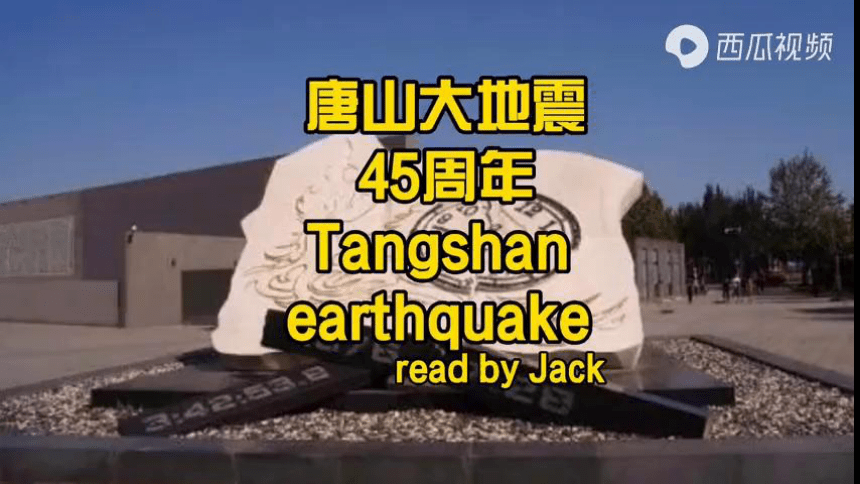
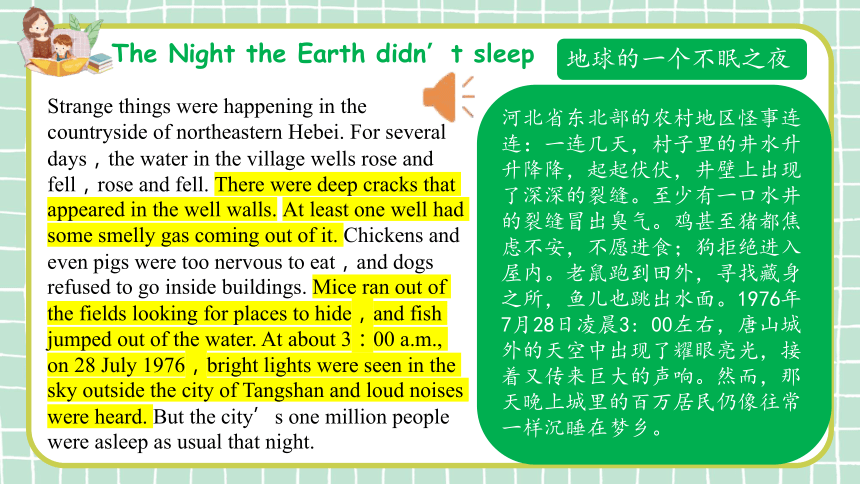
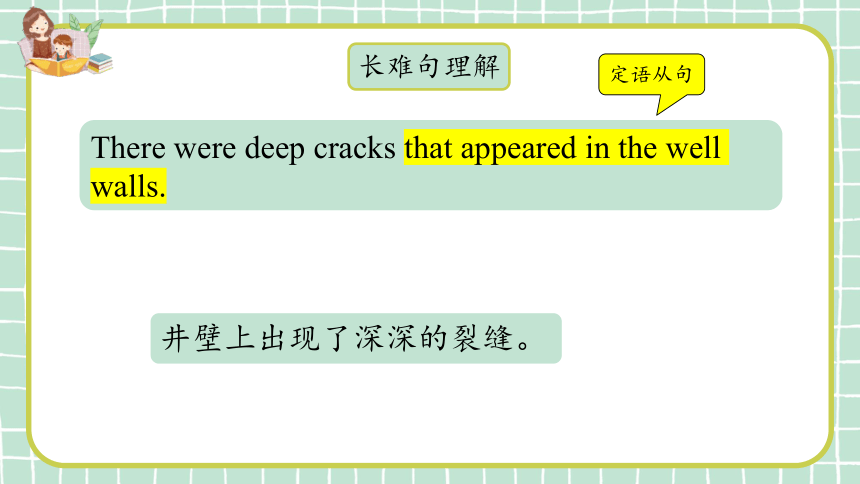


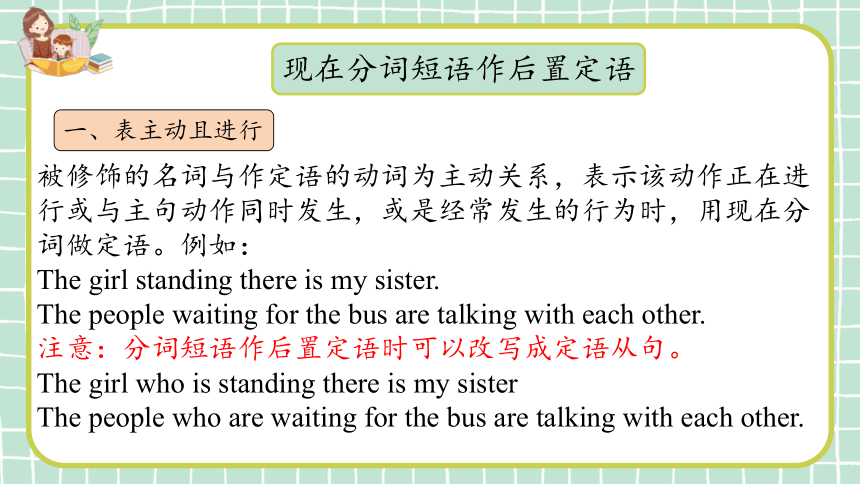

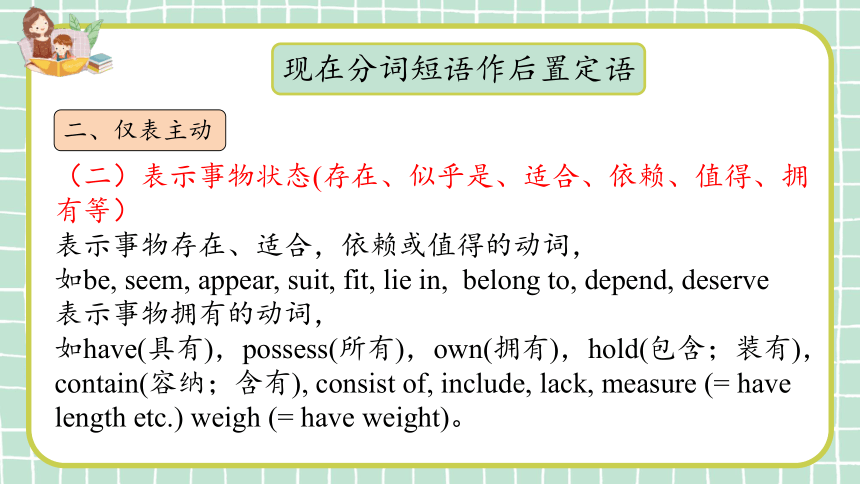
文档简介
(共106张PPT)
UNIT 4 : NATURAL DISASTERS
课文详解
新人教版2019必修一
Live to tell :Raising Awareness, Reducing Mortality.
——United Nations International Strategy for Disaster Reduction(2016)
用生命呼吁:增强减灾意识,减少人员伤亡。
——联合国国际减灾战略(2016)
The Night the Earth didn’t sleep (P50)
Tsunami Hits Asia: over 6, 500 dead (P54)
The Story of an Eyewitness (P92)
China to the Rescue (P94)
目
录
The Night the Earth didn’t sleep
Reading and Thinking
The Night the Earth didn’t sleep
Strange things were happening in the countryside of northeastern Hebei. For several days,the water in the village wells rose and fell,rose and fell. There were deep cracks that appeared in the well walls. At least one well had some smelly gas coming out of it. Chickens and even pigs were too nervous to eat,and dogs refused to go inside buildings. Mice ran out of the fields looking for places to hide,and fish jumped out of the water. At about 3:00 a.m., on 28 July 1976,bright lights were seen in the sky outside the city of Tangshan and loud noises were heard. But the city’s one million people were asleep as usual that night.
地球的一个不眠之夜
河北省东北部的农村地区怪事连连:一连几天,村子里的井水升升降降,起起伏伏,井壁上出现了深深的裂缝。至少有一口水井的裂缝冒出臭气。鸡甚至猪都焦虑不安,不愿进食;狗拒绝进入屋内。老鼠跑到田外,寻找藏身之所,鱼儿也跳出水面。1976年7月28日凌晨3: 00左右,唐山城外的天空中出现了耀眼亮光,接着又传来巨大的声响。然而,那天晚上城里的百万居民仍像往常一样沉睡在梦乡。
长难句理解
There were deep cracks that appeared in the well walls.
定语从句
井壁上出现了深深的裂缝。
长难句理解
At least one well had some smelly gas coming out of it.
现在分词做后置定语
至少有一口水井的裂缝冒出臭气。
smelly
单词释义: n. 气味,嗅觉;臭味;闻 v. 嗅,闻;察觉到;
1. The room smelled of lemons.
房间有股柠檬的气味。
2. It smells delicious.
它闻起来真香。
3. As soon as we opened the front door we could smell the gas.
我们一打开前门就能闻到那煤气味。
4. I took a fresh rose out of the vase on our table, and smelled it.
我从我们桌上的花瓶里取出一支新鲜的玫瑰,闻了闻。
现在分词短语作后置定语
被修饰的名词与作定语的动词为主动关系,表示该动作正在进行或与主句动作同时发生,或是经常发生的行为时,用现在分词做定语。例如:
The girl standing there is my sister.
The people waiting for the bus are talking with each other.
注意:分词短语作后置定语时可以改写成定语从句。
The girl who is standing there is my sister
The people who are waiting for the bus are talking with each other.
一、表主动且进行
现在分词短语作后置定语
(一)表示心理或情感的动词
表示心理的动词有:
Think , know, understand, forget, remember, believe,want,wish, desire,hope, need, mean,please,need, prefer, mind, agree, care等。
表示情感的动词有:
love(爱),adore(崇敬),like(喜欢),prefer(宁愿),mind(介意),object(反对),dislike(不喜欢),hate(恨),abhor(憎恶),detest(痛恨)等。
二、仅表主动
现在分词短语作后置定语
(二)表示事物状态(存在、似乎是、适合、依赖、值得、拥有等)
表示事物存在、适合,依赖或值得的动词,
如be, seem, appear, suit, fit, lie in, belong to, depend, deserve
表示事物拥有的动词,
如have(具有),possess(所有),own(拥有),hold(包含;装有),contain(容纳;含有), consist of, include, lack, measure (= have length etc.) weigh (= have weight)。
二、仅表主动
现在分词短语作后置定语
(三)表示短暂性动作的词
常见的短暂性动词有:accept, arrive, finish, decide, end, fall, give, receive, refuse, hurt。它们的发生与结束几近同时,所以不适合用“现在进行时”。
误:When he came in, I was receiving his letter.
正:When he came in, I just received his letter.
二、仅表主动
现在分词短语作后置定语
(四)感官动词
人通常有五种感官,即see(视觉),hear(听觉),smell(嗅觉),taste(味觉), feel(触觉)这些表示感官、感觉的动词,以及其近义词如notice, observe等不用于进行时态。
误:The medicine is tasting bitter.
正:The medicine tastes bitter.
误:I was seeing a car passing by our house.
正:I saw a car passing by our house.
二、仅表主动
长难句理解
Mice ran out of the fields looking for places to hide,and fish jumped out of the water.
现在分词做伴随状语
老鼠跑到田外,寻找藏身之所,鱼儿也跳出水面。
and 连接并列句
现在分词作伴随状语
理解“伴随状语”的关键是要理解“伴随”二字。
分词(短语)用作伴随状语时,它表示的动作伴随句子谓语动作同时发生,即句子谓语所表示的动作为主要动作,分词短语所表示的动作伴随性的次要动作。
英语中“动词+ing”形式作伴随状语时,它表示的是一个次要的动作,来对谓语表示的动作加以说明或作为陪衬。
一般将其置于句后,可用逗号与主句成分分开。
理解技巧:
现在分词作伴随状语
The boy sat in front of the farmhouse, cutting the branch.
All night long he lay awake, thinking of the problem.
The six blind men stood there begging for a meal.
He sat in the armchair, reading a newspaper.
They stood there for half an hour watching the stars in the sky.
He sat in the chair reading a newspaper.
Don't you sit there doing nothing.
长难句理解
At about 3:00 a.m., on 28 July 1976,bright lights were seen in the sky outside the city of Tangshan and loud noises were heard.
无灵主语
1976年7月28日凌晨3: 00左右,唐山城外的天空中出现了耀眼亮光,接着又传来巨大的声响。
and 连接并列句
无灵主语
(一)概念
无灵主语(inanimate subject),又叫做物称主语,指的是使用没有生命的事物充当句子的主语成分,例如物品、动作、情感、时间、地点等,这与中文表达中习惯“以人为本”的特点,即常常会把人这个行为主体作为句子主语的情况大相径庭,体现了英语语言所强调的客体思维。
无灵主语
二、无灵主语的种类
(一)主语是情感状态的抽象名词
谓语选择如:creep, strike, seize, dawn, catch, worm into, grip, enter, register, overcome, take possession of, surround, give way to, desert, pass, tear 等词。
1. Fear gripped the village. 整个村庄笼罩在恐怖之中。
2. Courage deserted him. 他没有了勇气。
3. His presence of mind deserted him. 他失去了沉着。
4. The earthquake struck the village two minutes ago.
无灵主语
二、无灵主语的种类
(二)主语是具有动词意味的名词,
谓语选择如 fill, give, make 等词汇。
1. The sight of the desolation filled me with forlornness.
看到这孤寂的景象,我心中满是凄凉。
2. The sight of his father-in-law made Fanjin afraid that he was in for another cursing. 见丈人在眼前,恐怕又要挨骂。
3. Only the thought of his mother gave him the strength to go on doing it.
只有想到母亲,他才有力量继续工作。
无灵主语
二、无灵主语的种类
(三)谓语动词如:slip, lend, elude, escape, stump 等词汇
1. His name escaped/ evaded/ failed me at the moment.
当时我没有记起他的名字。
2. The question eludes/stumps me. 这个问题把我难住了。
3. The mistake slips my attention. 我没有注意到这一错误。
4. His hint escaped me. 我没有注意到他的暗示。
5. The sentence eludes me. 我理解不了这个句子。
无灵主语
二、无灵主语的种类
(四)谓语动词如:deny, ask, admit, allow, fail, pass 等词
1. The scenery baffles/denies description. 风景美得难以描述。
2. Such a chance denied me. 我没有得到这样一个机会。
3. The matter asks immediate attention. 这件事需要立即处理。
4. The exigencies of the matter admitted no alternative. 此事紧急,别无他法。
5. Reproach spared him not, even in his grave.
即便是在他死后,人们也一直在谴责他。
6. Time fails me to finish the topic.
The Night the Earth didn’t sleep
At 3:42 a.m., everything began to shake. It seemed as if the world were coming to an end! Eleven kilometres directly below the city, one of the most deadly earthquakes of the 20th century had begun, a quake that even caused damage more than 150 kilometres away in Beijing. Nearly one third of the whole nation felt it! A huge crack, eight kilometres long and 30 metres wide, cut across houses, roads, and waterways. Hard hills of rock became rivers of dirt. In less than one minute, a large city lay in ruins. Two thirds of the people who lived there were dead or injured. Thousands of children were left without parents. The number of people who were killed or badly injured in the quake was more than 400,000.
地球的一个不眠之夜
凌晨3: 42,万物开始摇晃,仿佛世界末日即将来临!在城市正下方的11千米处,20世纪伤害最严重之一的地震爆发了,远在150多千米以外的北京都受到了这场地震的破坏,全国几乎三分之一的地区均有震感!一条8千米长、30米宽的巨大裂缝横切房屋、道路和水路。坚硬的石山变成了泥沙流。在不到一分钟的时间里,一座大城市沦为废墟。城里三分之二的居民在地震中死亡或受伤,数以千计的孩子失去了父母。在此次地震中丧亡或身受重伤的人数超过了40万。
长难句理解
It seemed as if the world were coming to an end!
暗喻的修辞手法
仿佛世界末日即将来临!
as if
1、在look, seem等系动词后引导表语从句
eg: He looks as if he were ten years younger. (虚拟语气)
It seems as if our team is going to win.(陈述语气)
2、引导方式状语从句
eg: She loves the boy as if she were his mother. (虚拟语气)
The child talked to us as if he were a grow-up. (虚拟语气)
(注意:虚拟语气中只有were,不用was。)
一、as if 在从句中的作用
as if
如果as if引导的从句是“主语+系动词”结构,且从句的主语与主句的主语一致,可以省略主语和系动词,这样as if 后就只剩下名词、不定式、形容词(短语)、介词短语或分词。
eg: He acts as if (he was) an old hand. 他做事像个老手。
Tom raised his hands as if (he was going) to say something.
Tom举起手好像要说什么。
She left the room hurriedly as if (she was) sad.
她匆忙离开房间好像难过的样子。
二、as if 用于省略句中
as if
1、as if 从句用于陈述语气
当说话者认为句子所述的是真实的或极有可能发生或存在的事实时。
eg: It looks as if we'll be late.
This meat tastes as if it has already gone bad.
It sounds as if it is raining.
He talks as if he is drunk.
三、as if 从句的语气及时态
as if
2、as if 从句用于虚拟语气
当说话人认为句子所述的不真实或极少有可能发生或存在的情况时。从句虚拟语气动词时态的形式如下:
(1)如果从句表示与现在事实相反,谓语动词用一般过去式。
eg: You look as if you didn’t like this villa.
你看起来好像不喜欢这个别墅似的。
He talks as if he knew everything around the world.
他说话的样子,好像他什么都知道似的。
三、as if 从句的语气及时态
as if
2、as if 从句用于虚拟语气
当说话人认为句子所述的不真实或极少有可能发生或存在的情况时。从句虚拟语气动词时态的形式如下:
(2)如果从句表示与过去事实相反,谓语动词用“had+过去分词”。
eg: He talks about France as if he had been there before.
The girl listened to me as if she had been turned to stone.
那个女孩倾听着,一动也不动,好像已经变成了石头似的。
三、as if 从句的语气及时态
as if
2、as if 从句用于虚拟语气
当说话人认为句子所述的不真实或极少有可能发生或存在的情况时。从句虚拟语气动词时态的形式如下:
(3)如果从句表示与将来事实相反,谓语动词用“would/could/might+动词原形”。
eg: He opened his mouth as if he would say something.
他张开嘴好像要说什么。
It looks as ifit might snow.看起来好像要下雪了。
三、as if 从句的语气及时态
长难句理解
In less than one minute, a large city lay in ruins.
拟人的修辞手法
在不到一分钟的时间里,一座大城市沦为废墟。
ruin
ruin n.&vt.破坏;毁坏
①be/lie in ruins 成为废墟;毁灭
②reduce...to ruins 使……成为废墟
③ruin oneself 自我毁灭
(1)ruin指毁坏某种好的或者有用的东西。
用作名词,意为“毁灭;废墟”。
(2)damage损坏、毁坏,指部分损坏,降低某物的价值,
通常接物。
(3)destroy指彻底地破坏,一般不可修复,
常作“破坏;毁灭”讲。也指希望、计划等的破灭。
长难句理解
Two thirds of the people who lived there were dead or injured.
定语从句
城里三分之二的居民在地震中死亡或受伤。
The Night the Earth didn’t sleep
Everywhere survivors looked,there was nothing but ruins. Nearly everything in the city was destroyed. About 75 percent of the city’s factories and buildings,90 percent of its homes,and all of its hospitals were gone. Bricks covered the ground like red autumn leaves,but no wind could blow them away. Most bridges had fallen or were not safe to cross. The railway tracks were now useless pieces of metal. Tens of thousands of cows,hundreds of thousands of pigs,and millions of chickens were dead. Sand now filled the wells instead of water. People were in shock—and then,later that afternoon,another big quake shook Tangshan again. Even more buildings fell down. Water,food,and electricity were hard to get. People began to wonder how long the disaster would last.
地球的一个不眠之夜
幸存者目及之处无一不是废墟,万物尽毁。市内大约75%的工厂和大楼、90%的住房和所有的医院都倒塌了。砖块就像秋天的红叶覆盖着地面,但是却没有风能将其吹走。大多数桥梁不是坍塌了就是无法安全通行了。铁轨变成了废金属块;数万头奶牛、 数十万头猪和数百万只鸡也都死掉了。沙子灌满水井,井水消失殆尽。人们惊恐万状,然而临近傍晚时分,又一次强烈的地震撼动唐山。更多的楼房倒塌了。没有水、食物,电也停了。人们心里开始疑惑这场灾难还会持续多久。
nothing but
(1) 名词或代词
For miles and miles I could see nothing except (= but) a great fire and lots of smoke.
Under the soil there is nothing but sand.
(2) 不定式
He did nothing but sleep all day long.
I can but obey it.(= I can do nothing but obey it.)
Politeness costs nothing but wins everything.
(除……外;什么也没有;只有)后面可接
gone
1、adj:过去的;用完了;死去的;无望的,无可挽救的
The spring is gone. 春天已经过去了。
2、v: go的过去分词,用于过去时;
I went home yesterday. 我昨天回家了
3、prep: 晚于,超过(某一时间)
It was just gone 7 o'clock this evening when I finished.
今晚我做完的时候刚过7点。
长难句理解
Bricks covered the ground like red autumn leaves,but no wind could blow them away.
明喻的修辞手法
砖块就像秋天的红叶覆盖着地面,但是却没有风能将其吹走。
but 连接并列句
长难句理解
People began to wonder how long the disaster would last.
how long 引导的宾语从句
人们心里开始疑惑这场灾难还会持续多久。
last
1、v. 持续;维持
2、adj. 最近的;上一个的;末尾的;最后的
3、adv. 最后;最近一次
4、n. 最后来的人(或发生的事);鞋楦(做鞋的模型)
The wind is changing round, so the storm won't last long.
风正在转向,因此暴风雨不会持续太长的时间。
The Night the Earth didn’t sleep
But hope was not lost. Soon after the quakes,the army sent 150,000 soldiers to Tangshan to dig out those who were trapped and to bury the dead. More than 10,000 doctors and nurses came to provide medical care. Workers built shelters for survivors whose homes had been destroyed. Hundreds of thousands of people were helped. Water and food were brought into the city by train,truck,and plane. Slowly,the city began to breathe again.
地球的一个不眠之夜
然而,希望尚存。地震发生后不久,部队派出了15万名士兵奔赴唐山,将受困群众从废墟中抢救出来,并掩埋了死者。上万名医疗工作者赶到现场,救死扶伤。工人为那些家园被毁的幸存者盖起了避难所,数十万的群众获到了帮助,火车、卡车和飞机给城市运来了食物和饮用水。慢慢地,这座城市又开始恢复了生机。
长难句理解
Soon after the quakes,the army sent 150,000 soldiers to Tangshan to dig out those who were trapped and to bury the dead.
时间状语
地震发生后不久,部队派出了15万名士兵奔赴唐山,将受困群众从废墟中抢救出来,并掩埋了死者。
定语从句
provide
1. 提供[(+for)]
On Sundays his landlady provided dinner as well as breakfast.
星期天,他的女房东不但供给早餐,还供给晚餐。
2. 装备,供给[(+with)]
Somehow she managed to provide her children with food and clothing.
她总算设法使她的孩子有饭吃,有衣穿。
3. 规定[+(that)]
The law provides that these ancient buildings must be preserved.
法律规定,这些古老的建筑应该保存.
长难句理解
Workers built shelters for survivors whose homes had been destroyed.
定语从句
工人为那些家园被毁的幸存者盖起了避难所。
长难句理解
Slowly,the city began to breathe again.
拟人的修辞手法
慢慢地,这座城市又开始恢复了生机。
The Night the Earth didn’t sleep
Tangshan started to revive itself and get back up on its feet. With strong support from the government and the tireless efforts of the city’s people,a new Tangshan was built upon the earthquake ruins. The new city has become a home to more than seven million people,with great improvements in transportation,industry,and environment. Tangshan city has proved to China and the rest of the world that in times of disaster,people must unify and show the wisdom to stay positive and rebuild for a brighter future.
地球的一个不眠之夜
唐山重新站起来并获得了新生。有了来自政府的大力支持以及唐山人民的不懈努力,一座新的唐山在废墟中被建立起来。这座新的城市已经成为700多万人的家园,交通、工业和环境都得到了巨大的改善。唐山向中国、向世界证明,在自然灾难中,人民必须勠力同心,保持乐观的心态和重建家园的决心。
长难句理解
Tangshan started to revive itself and get back up on its feet.
拟人的修辞手法
唐山重新站起来并获得了新生。
revive
v. (使)复兴;(使)复活(苏醒)
长难句理解
Tangshan city has proved to China and the rest of the world that in times of disaster,people must unify and show the wisdom to stay positive and rebuild for a brighter future.
宾语从句
唐山向中国、向世界证明,在自然灾难中,人民必须勠力同心,保持乐观的心态和重建家园的决心。
unify
v. 使成一体; 成为一体
He pledged to unify the city's political factions.
他保证要统一全市的政治小集团。
...constitutional reforms designed to unify the country.
…旨在统一国家的宪法改革。
unified adj.统一的
...a unified system of taxation.
…统一的税制。
Tsunami Hits Asia: over 6, 500 dead
Reading for Writing
Tsunami Hits Asia: over 6, 500 dead
The most powerful earthquake in the past 40 years caused a tsunami that crashed into coastlines across Asia yesterday, killing more than 6,500 people in Indonesia, India, Thailand, Malaysia, and at least four other countries. Fishermen, tourists, hotels, homes, and cars were swept away by huge waves caused by the strong earthquake that reached a magnitude of 9.0. The undersea quake struck around 7:00 a.m., Sunday off the west coast of Indonesia’s Sumatra Island. In that area alone, at least 1,870 people were killed.
海啸袭击亚洲:6500余人丧生
昨日,40年来最为强烈的地震引发了冲击亚洲沿海地带的海啸,造成印度尼西亚、印度、泰国、马来西亚和至少其他四个国家6500多人死亡。渔民、游客、酒店、住房和汽车都被高达9.0级的强震所引发的巨浪卷走。海啸巨浪由周日上午7点许发生在印度尼西亚苏门答腊岛西岸附近海域的海底地震引发。仅该地区就有至少1870人遇难。
长难句理解
The most powerful earthquake in the past 40 years caused a tsunami that crashed into coastlines across Asia yesterday, killing more than 6,500 people in Indonesia, India, Thailand, Malaysia, and at least four other countries.
定语从句
昨日,40年来最为强烈的地震引发了冲击亚洲沿海地带的海啸,造成印度尼西亚、印度、泰国、马来西亚和至少其他四个国家6500多人死亡。
现在分词做结果状语
现在分词做结果状语
There is mud and water everywhere, making it difficult to travel from place to place.
现在分词作结果状语表示一种必然性(自然结果)。(making 可以改为 which makes,相当于一个前因后果的非限制性定语从句。)
﹡He comes home late every evening, making his wife very angry.
=He comes home late every evening, which makes his wife very angry.
=He comes home late every evening, and it makes his wife very angry.
长难句理解
Fishermen, tourists, hotels, homes, and cars were swept away by huge waves caused by the strong earthquake that reached a magnitude of 9.0.
过去分词做后置定语
渔民、游客、酒店、住房和汽车都被高达9.0级的强震所引发的巨浪卷走。
定语从句
过去分词做后置定语
1.一般放在名词后面,作后置定语。
与前面的名词之间,构成被动关系或表示完成。
The piano used at the concert is made in France.
在音乐会上用的这架钢琴是在法国制造的。
The story written by a middle school student is very popular.
由一名中学生写的这个故事很流行。
2. 单个过去分词作定语:可放在名词前面也可以放后面。
All the broken windows have been repaired.
所有坏了的窗户都已经修好了。
The ground is covered with fallen leaves.
地上铺满了落叶。
Tsunami Hits Asia: over 6, 500 dead
In Sri Lanka, some 1,600 kilometres west of the quake centre, the number of deaths stood at 2,498, and one million more were affected by the tsunami, government officials said. Indian officials said as many as 1,900 had been killed along the southern coast. Another 254 were found dead in Thailand and 54 in three other countries. In southern Thailand, 1,900 people were hurt and many more were missing, local officials said. “I was having breakfast with my three children when water started filling my home. We had to leave everything and run to safety,” said Chandra Theeravit, a local Thai woman.
海啸袭击亚洲:6500余人丧生
政府官员称,在震中以西约1600千米处的斯里兰卡,死亡人数高达2498人,另有100多万人受到海啸的影响。印度官员称,南部沿海地区有多达1900人丧生。泰国另有254人死亡,其他三个国家则有54人丧生。当地官员表示,泰国南部有1900人受伤,失踪人数则更多。泰国当地一位女子钱德拉·特拉维说:“当时我和我的三个孩子正在吃早饭,海水开始灌入屋内。我们只好放弃一切,逃到安全的地方。”
stand
1. (stall) 摊子
a newspaper stand 报摊
2. 展台
3. 看台
4. 架子
A number of hats hung from a stand.
架子上挂了几顶帽子。
名词
stand
5. 站立
She was standing at the bus stop. 她站在公共汽车站。 6. (rise) 站起来
The judge asked us all to stand. 法官让我们都站起来。 7. (be situated) 耸立
The house stands alone on top of a hill.
那幢房子傲然耸立在山顶上。
8. (remain) 保持有效
Our original offer stands. 我们当初的提议仍然有效。
不及物动词
stand
9. (in election) 当候选人
She was invited to stand as the Liberal candidate.
她被邀请做自由党候选人。
10. = run
11. to stand aside/back 让开/退后
12. where {or} how does he stand on...
他对...持什么态度?
不及物动词
stand
13. to stand sth on/in sth 将某物竖放在某物上/中
14. (withstand, tolerate) 经受住
The economy will not stand another rise in interest rates. 经济将经受不起利息的再次上升。
15. I can't stand him/it 我无法容忍他/它
出庭作证 to make a stand against sth 反抗某物
to take a stand on sth 对某事表明立场
sb's last stand 某人的最后一搏
及物动词
Tsunami Hits Asia: over 6, 500 dead
Thousands of people are still missing, and the number of deaths is expected to grow even higher over the next few days. Foreign aid is being organised for the tsunami-hit countries. However, dangerous conditions and damaged roads will make it difficult to deliver food and supplies.
海啸袭击亚洲:6500余人丧生
目前仍有数千人失踪,预计在未来几天死亡人数还将增加。目前(人们)正在为这些受海啸袭击的国家组织外援。然而,由于条件险恶和道路受阻,食物运送和物资补给将非常困难。
长难句理解
However, dangerous conditions and damaged roads will make it difficult to deliver food and supplies.
然而,由于条件险恶和道路受阻,食物运送和物资补给将非常困难。
it做形式宾语
it作形式宾语
一般说来,当不定式、动名词、从句等用作宾语且其后跟有宾语补足语时,就应在宾语补足语前使用形式宾语,而将真正的宾语移至句末。所以 it 用作形式宾语的基本句型是:
动词+形式宾语+宾语补足语+真正的宾语。
I think it is convenient to come at two.
我认为两点钟来较适合。
Even now I find it hard to believe her story.
即使现在我发现仍相信她的话。
I find it difficult to talk to you.
我觉得同你谈话很难。
The Story of an Eyewitness
Workbook-reading
The Story of an Eyewitness
San Francisco,May 5,1906.
The earthquake that hit San Francisco on April 18 shook down hundreds of thousands of dollars' worth of walls and chimneys. But the fire that followed burned up hundreds of millions of dollars worth of buildings and homes. Never before in history has a city been so completely destroyed. San Francisco is gone.The factories, the great stores and newspaper building,the hotels,and the great houses of the rich are all gone.
目击者的报道(改编)
旧金山,1906年5月5日
这场在四月十八号袭击了旧金山的地震使摧毁了价值数十万美元的墙壁和烟囱。不过,紧接着的大火更是烧掉了价值上数亿美元的建筑和房子。历史上从来没有过这样被完全毁坏的城市。旧金山消失了。工厂、大商店、报馆、宾馆和富人的大房子也都消失了。
长难句理解
But the fire that followed burned up hundreds of millions of dollars worth of buildings and homes.
不过,紧接着的大火更是烧掉了价值上数亿美元的建筑和房子。
But the fire that followed burned up hundreds of millions of dollars worth of buildings and homes.
定语从句
worth
be worth + n. 当名词为金钱时,表示"…… 值得……"
be worth doing sth. "……某事值得被做"
The question is not worth discussing again and again.
worth
be worthy of +n. 抽象名词时表示"……值得……"
be worthy to be done. "某事值得被做"
The question is not worth discussing again and again.
worthy
The Story of an Eyewitness
On Wednesday morning at a quarter past five came the earthquake. A moment later, the disaster was a fact. South of Market Street,in the working-class neighborhoods and in the factories, fires started. Within an hour of the first quake, the smoke could be seen100 miles away. The sun was red in the dark sky. There was no stopping the fires. The firefighters to whom the task was given did their best but there was no way to organize or communicate. The railway tracks were now useless and there was no water in water pipes. All of the ways man had made to keep the city safe were gone in the 30 seconds the earth moved.
目击者的报道(改编)
地震发生在星期三早上5点15分。只一会儿,灾难已成事实。南市场街,工人居住地以及工厂各处大火蔓延。不出一小时,百里之外都可以看到滚滚浓烟。黑色的天空上挂着一轮赤红的太阳。火还没停止。执行任务的消防员尽力做到了最好但是仍没办法组织和交流。现在铁轨已经没有用了,水管里也没了水。所有人们用来使城市保持安全运行的方法都已经在地震的三十秒内失效了。
长难句理解
But the fire that followed burned up hundreds of millions of dollars worth of buildings and homes.
地震发生在星期三早上5点15分。
On Wednesday morning at a quarter past five came the earthquake.
完全倒装句
表示地点的here和 there位于句首时,其后用完全倒装形式。这类倒装句的谓语通常是动词be和come, go等表示移动或动态的不及物动词:
Here's Tom. 汤姆在这里。
There's Jim. 吉姆在那儿。
Here comes the bus. 公共汽车来了。
There goes the bell. 铃响了。
There goes the last train. 最后一班火车开走了。
1. here 和there位于句首时的倒装
完全倒装
地点副词away, down, in, off, out, over, round, up 等位于句首时,其后用完全倒装语序。这类倒装句的谓语通常表示动态的不及物动词:
Away went the runners. 赛跑选手们跑远了。
Round and round flew the plane. 飞机盘旋着。
The door opened and in came Mr Smith.
Down came the rain and up went the umbrellas.
下雨了,伞都撑起来了。
2. away和down等位于句首时的倒装
完全倒装
为了保持句子平衡或使上下文衔接紧密,有时可将状语或表语置于句首,句中主语和谓语完全倒装:
Among these people was his friend Jim.
他的朋友吉姆就在这些人当中。
By the window sat a young man with a magazine in his hand.
窗户边坐着一个年轻人,手里拿着一本杂志。
3. 状语或表语位于句首时的倒装
完全倒装
有时为了强调,可将谓语部分的现在分词、过去分词或不定式置于句首,从而构成倒装:
Buried in the sands was an ancient village.
一个古老的村庄被埋在这沙土之中。
Standing beside the table was his wife.
站在桌旁的是他的妻子。
To be carefully considered are the following questions.
下列问题要仔细考虑。
4. 分词和不定式置于句首的倒装
完全倒装
长难句理解
But the fire that followed burned up hundreds of millions of dollars worth of buildings and homes.
执行任务的消防员尽力做到了最好但是仍没办法组织和交流。
The firefighters to whom the task was given did their best but there was no way to organize or communicate.
定语从句
长难句理解
But the fire that followed burned up hundreds of millions of dollars worth of buildings and homes.
所有人们用来使城市保持安全运行的方法都已经在地震的三十秒内失效了。
All of the ways man had made to keep the city safe were gone in the 30 seconds the earth moved.
定语从句
The Story of an Eyewitness
By Wednesday afternoon, half of the city was gone. At that time, I watched the disaster from a ship on the bay. Out at sea it was calm. No wind came up. Yet from every direction-- east, west, north, and south-strong winds blew upon the unlucky city and those whose homes had once stood in its green hills.
目击者的报道(改编)
到星期三下午,半个城市都已消失。当时,我还亲眼见到海湾处一艘船上发生的灾难。海面上风平浪静。然而,在这不幸的城市里,从东南西北各个方向吹来的大风正肆意地刮着,也吹拂着那些曾在青丘上拥有房子的人们。
长难句理解
But the fire that followed burned up hundreds of millions of dollars worth of buildings and homes.
然而,在这不幸的城市里,从东南西北各个方向吹来的大风正肆意地刮着,也吹拂着那些曾在青丘上拥有房子的人们。
Yet from every direction-- east, west, north, and south-strong winds blew upon the unlucky city and those whose homes had once stood in its green hills.
定语从句
The Story of an Eyewitness
Wednesday night saw the destruction of the very heart of the city. Man himself had to make ruins of some of the city's best buildings so that they would not be a danger to those in the streets. Tens of thousands who had lost their homes left the city to look for shelter from the fires. Some were dressed only in blankets and carried the things that they had been able to rescue from the fires. But there were no fights and no pushing or shoving. Somehow this worst of disasters brought out the best in the survivors. Never in all of San Francisco's history were her people so kind as on this night of terror.
目击者的报道(改编)
星期三晚上见证了城市中心的毁灭。人们必须毁掉一些城市最好的房子,是为了它们不会对街道的行人造成危险。数以万计失去房子的人们离开城市去寻找避难所。有些人只是裹了毯子,带着他们从火灾中抢救的东西。不过,没有打架,没有各种推搡。这场最严重的灾难,不知怎么地,呈现了幸存者最好的一面。旧金山的历史上,她的人民从没有像这个恐怖之夜那样友善。
长难句理解
But the fire that followed burned up hundreds of millions of dollars worth of buildings and homes.
旧金山的历史上,她的人民从没有像这个恐怖之夜那样友善。
Never in all of San Francisco's history were her people so kind as on this night of terror.
部分倒装
在正式文体中,never, seldom, rarely, little, hardly,scarcely, no sooner, no longer, nowhere 等含有否定意义的副词若位于句首,则其后要用部分倒装:
I shall never forgive him. / Never shall I forgivehim.
He seldom goes out for dinner. / Seldom does hego out for dinner.
She hardly has time to listen to music. / Hardlydoes she have time to listen to music.
1. 否定副词位于句首时的倒装
部分倒装
当一个状语受副词only的修饰且置于句首时,其后用部分倒装语序:
Only then did he realize that he was wrong.
到那时他才意识到他错了。
Only in this way are you able to do it well.
你只有用这种方法才能把它做好。
Only when he returned home did he realize what had happened.
当他回到家里时,才知道出了什么事。
2.“only+状语”位于句首时的倒装
部分倒装
副词so后接形容词或副词位于句首时,其后用部分倒装:So cold was the weather that we had to stay at home.
天气太冷,我们只好呆在家里。
So fast does light travel that we can hardly imagine its speed.
光速很快,我们几乎没法想像它的速度。
So sudden was the attack that we had no time to escape.
袭击来得非常突然,我们来不及逃跑。
3. “so+adj. / adv.”位于句首时的倒装
部分倒装
当要表示前面提出的某一肯定的情况也同样适合于后者,通常就要用“So+助动词+主语”这种倒装结构:
You are young and so am I.
你年轻,我也年轻。
She likes music and so do I.
她喜欢音乐,我也喜欢。
If he can do it, so can I.
要是他能做此事,我也能。
4.“so+助动词+主语”倒装
部分倒装
当not only…but also位于句首引出句子时,not only 后的句子通常用部分倒装形式:
Not only is he a teacher, but he is also a poet.
他不仅是一位教师,而且是一位诗人。
Not only did he speak more correctly, but he spoke more easily.
不仅他讲得更正确,也讲得更不费劲了。
5. 由not only…but also引出的倒装
部分倒装
当if引导的虚拟条件从句中含有had, were, should等时,如将if省略,则要将had, were, should等移到主语前,构成倒装句:
Had you come yesterday, you would have seen him.
若你昨天来,你就会见到他了。
Should you require anything give me a ring.
如果需要什么,可以给我打电话。
Were it not for your help, I would still be homeless.
要不是你帮助,我会仍然无家可归。
6. 虚拟条件句的省略与倒装
部分倒装
China to the Rescue
Expanding Your World
China to the Rescue
The China International Search and Rescue Team (CISAR) was formed in 2001 and is now made up of several hundred rescue workers and about 20 sniffer dogs. The team brings help and hope to those whose lives are changed by a storm, flood, earthquake, or any other natural disaster.
中国营救
中国国际救援队(CISAR)成立于2001年,现在由数百个搜救人员和大约20条搜救犬组成。这个团队给那些生活被风暴、洪水、地震或者其他自然灾害改变的人们带来了帮助和希望。
sniffer dogs
China to the Rescue
After long and careful training, the team went on its first international rescue missions in 2003. That year, the Chinese team helped save lives after earthquakes in Algeria (阿尔及利亚)and Iran (伊朗). It was the first time that a Chinese team had worked outside China, and the team won high praise for their bravery and skill.
中国营救
经过长期且细致的训练,这个队伍在2003年执行了第一次国际救援任务。在那一年,在阿尔及利亚和伊朗地震后,这支中国队伍帮助拯救了生命。那是中国队伍第一次在国外工作,由于勇敢和技能赢得了高度赞扬。
长难句理解
But the fire that followed burned up hundreds of millions of dollars worth of buildings and homes.
那是中国队伍第一次在国外工作,由于勇敢和技能赢得了高度赞扬。
It was the first time that a Chinese team had worked outside China, and the team won high praise for their bravery and skill.
固定搭配
It's the first time that句型
这是一个固定句型。“这是某人第一次做某事”
It is the first time that ... has/have done sth.
It was the first time that ... had done sth.
一、结构:
一个特殊的句型强调句,主要考察that后面的用法。
一般说来,在It [This] is the first time+that-结构中,that-从句通常用现在完成时:
二、用法:
China to the Rescue
Since then, the CISAR has completed many missions. The list of people to whom help has been given is long. The team treated more than 3,000 people who were injured in the 2006 earthquake in Indonesia, helped 2,500 wounded people after the earthquake that hit Haiti (海地) in 2010, and spent several months giving aid to over 25,000 victims of the 2010 floods in Pakistan(巴基斯坦).
中国营救
从那时起,CISAR完成了许多任务。得到帮助的人的名单很长。2006年印度尼西亚地震后,这支队伍治疗了因地震受伤的三千多人,2010年海地地震后帮助了2500 名伤员,2021年巴基斯坦洪水后,对25000多名受害者提供了援助。
长难句理解
But the fire that followed burned up hundreds of millions of dollars worth of buildings and homes.
得到帮助的人的名单很长。
The list of people to whom help has been given is long.
定语从句
China to the Rescue
Rescue workers are trained to find people, treat injuries, and hand out food, water, and other supplies. They have to be able to do work that is difficult under conditions which can be very dangerous. After a disaster, there is usually no electricity or water, and there may be diseases and accidents. Rescue workers get to save lives, but they must also bury the dead. That means they have to be strong in both body and mind.
中国营救
救援人员受过训练,搜救人、治疗伤者、分发食物、水和其他物资。他们必须能够在可能很危险的情况下进行困难的工作。一场灾难之后,通常没有电和水,而且可能会有各种疾病和意外事故。救援人员拯救生命,但也必须埋葬死者。这就意味着他们在身体和思维上都必须坚强。
长难句理解
But the fire that followed burned up hundreds of millions of dollars worth of buildings and homes.
他们必须能够在可能很危险的情况下进行困难的工作。
They have to be able to do work that is difficult under conditions which can be very dangerous.
定语从句
定语从句
China to the Rescue
Rescue workers must have big hearts, too. It takes a lot of love and courage to risk one's own life to save someone else's. The members of the CISAR have plenty of both and are always ready to go wherever help is needed.
中国营救
救援人员还必须心胸宽广。冒着生命危险去救其他人需要很大的爱和勇气。CISAR的成员有这样的心胸和勇气,而且随时准备好前往任何需要帮助的地方.
长难句理解
But the fire that followed burned up hundreds of millions of dollars worth of buildings and homes.
冒着生命危险去救其他人需要很大的爱和勇气。
It takes a lot of love and courage to risk one's own life to save someone else's.
it做形式主语
“it” 作为形式主语
1、It’s +形容词/名词+(for sb. / sth)+to do sth
在这个句型中,常见的形容词和名词有:no /little use, no /much good, useless等。例如:
It is no use crying over spilt milk.
It is no good talking about other’s faults.
2、It’s +形容词+of sb. +to do sth
3、It’s +形容词/名词+doing sth
“it” 作为形式主语
4、It’s +形容词+that…
形容词有:possible, important, impossible, necessary, strange, natural, surprising, obvious, true, likely, unusual等。除了true, likely, obvious这三个词外,其他的词后面that从句一般要用虚拟语气,(should+动词原形)should可以省略。
5、It’s +名词+that…
在这个句型中,常用的名词有:fact, honor, belief, good thing / news, (no)wonder, no doubt, pity, shame等。
“it” 作为形式主语
6、It’s +及物动词的过去分词+that…
能用于这个句型中的不及物动词常见的有:seem, happen, appear, matter等。
7、It+不及物动词+that…
8、It+及物动词+宾语+主语从句
用于这类句型的动词有:affect, disappoint, impress, interest, worry等。
“it” 作为形式主语
9、It takes sb. + sometime to do sth.
这个句型的意思是“花费某人多长时间做某事”例如:
It took us half an hour to ride to the town by bike.
10、It’s time (about time, high time ) +that…
这个句型中that后面的从句要用虚拟语气,需要注意的是:常常用过去时态表示虚拟,有的时候也用should+动词原形,should不能省略。意思是 “(正是)……的时候……”
THANK YOU !
课文详解
新人教版2019必修一
UNIT 4 : NATURAL DISASTERS
课文详解
新人教版2019必修一
Live to tell :Raising Awareness, Reducing Mortality.
——United Nations International Strategy for Disaster Reduction(2016)
用生命呼吁:增强减灾意识,减少人员伤亡。
——联合国国际减灾战略(2016)
The Night the Earth didn’t sleep (P50)
Tsunami Hits Asia: over 6, 500 dead (P54)
The Story of an Eyewitness (P92)
China to the Rescue (P94)
目
录
The Night the Earth didn’t sleep
Reading and Thinking
The Night the Earth didn’t sleep
Strange things were happening in the countryside of northeastern Hebei. For several days,the water in the village wells rose and fell,rose and fell. There were deep cracks that appeared in the well walls. At least one well had some smelly gas coming out of it. Chickens and even pigs were too nervous to eat,and dogs refused to go inside buildings. Mice ran out of the fields looking for places to hide,and fish jumped out of the water. At about 3:00 a.m., on 28 July 1976,bright lights were seen in the sky outside the city of Tangshan and loud noises were heard. But the city’s one million people were asleep as usual that night.
地球的一个不眠之夜
河北省东北部的农村地区怪事连连:一连几天,村子里的井水升升降降,起起伏伏,井壁上出现了深深的裂缝。至少有一口水井的裂缝冒出臭气。鸡甚至猪都焦虑不安,不愿进食;狗拒绝进入屋内。老鼠跑到田外,寻找藏身之所,鱼儿也跳出水面。1976年7月28日凌晨3: 00左右,唐山城外的天空中出现了耀眼亮光,接着又传来巨大的声响。然而,那天晚上城里的百万居民仍像往常一样沉睡在梦乡。
长难句理解
There were deep cracks that appeared in the well walls.
定语从句
井壁上出现了深深的裂缝。
长难句理解
At least one well had some smelly gas coming out of it.
现在分词做后置定语
至少有一口水井的裂缝冒出臭气。
smelly
单词释义: n. 气味,嗅觉;臭味;闻 v. 嗅,闻;察觉到;
1. The room smelled of lemons.
房间有股柠檬的气味。
2. It smells delicious.
它闻起来真香。
3. As soon as we opened the front door we could smell the gas.
我们一打开前门就能闻到那煤气味。
4. I took a fresh rose out of the vase on our table, and smelled it.
我从我们桌上的花瓶里取出一支新鲜的玫瑰,闻了闻。
现在分词短语作后置定语
被修饰的名词与作定语的动词为主动关系,表示该动作正在进行或与主句动作同时发生,或是经常发生的行为时,用现在分词做定语。例如:
The girl standing there is my sister.
The people waiting for the bus are talking with each other.
注意:分词短语作后置定语时可以改写成定语从句。
The girl who is standing there is my sister
The people who are waiting for the bus are talking with each other.
一、表主动且进行
现在分词短语作后置定语
(一)表示心理或情感的动词
表示心理的动词有:
Think , know, understand, forget, remember, believe,want,wish, desire,hope, need, mean,please,need, prefer, mind, agree, care等。
表示情感的动词有:
love(爱),adore(崇敬),like(喜欢),prefer(宁愿),mind(介意),object(反对),dislike(不喜欢),hate(恨),abhor(憎恶),detest(痛恨)等。
二、仅表主动
现在分词短语作后置定语
(二)表示事物状态(存在、似乎是、适合、依赖、值得、拥有等)
表示事物存在、适合,依赖或值得的动词,
如be, seem, appear, suit, fit, lie in, belong to, depend, deserve
表示事物拥有的动词,
如have(具有),possess(所有),own(拥有),hold(包含;装有),contain(容纳;含有), consist of, include, lack, measure (= have length etc.) weigh (= have weight)。
二、仅表主动
现在分词短语作后置定语
(三)表示短暂性动作的词
常见的短暂性动词有:accept, arrive, finish, decide, end, fall, give, receive, refuse, hurt。它们的发生与结束几近同时,所以不适合用“现在进行时”。
误:When he came in, I was receiving his letter.
正:When he came in, I just received his letter.
二、仅表主动
现在分词短语作后置定语
(四)感官动词
人通常有五种感官,即see(视觉),hear(听觉),smell(嗅觉),taste(味觉), feel(触觉)这些表示感官、感觉的动词,以及其近义词如notice, observe等不用于进行时态。
误:The medicine is tasting bitter.
正:The medicine tastes bitter.
误:I was seeing a car passing by our house.
正:I saw a car passing by our house.
二、仅表主动
长难句理解
Mice ran out of the fields looking for places to hide,and fish jumped out of the water.
现在分词做伴随状语
老鼠跑到田外,寻找藏身之所,鱼儿也跳出水面。
and 连接并列句
现在分词作伴随状语
理解“伴随状语”的关键是要理解“伴随”二字。
分词(短语)用作伴随状语时,它表示的动作伴随句子谓语动作同时发生,即句子谓语所表示的动作为主要动作,分词短语所表示的动作伴随性的次要动作。
英语中“动词+ing”形式作伴随状语时,它表示的是一个次要的动作,来对谓语表示的动作加以说明或作为陪衬。
一般将其置于句后,可用逗号与主句成分分开。
理解技巧:
现在分词作伴随状语
The boy sat in front of the farmhouse, cutting the branch.
All night long he lay awake, thinking of the problem.
The six blind men stood there begging for a meal.
He sat in the armchair, reading a newspaper.
They stood there for half an hour watching the stars in the sky.
He sat in the chair reading a newspaper.
Don't you sit there doing nothing.
长难句理解
At about 3:00 a.m., on 28 July 1976,bright lights were seen in the sky outside the city of Tangshan and loud noises were heard.
无灵主语
1976年7月28日凌晨3: 00左右,唐山城外的天空中出现了耀眼亮光,接着又传来巨大的声响。
and 连接并列句
无灵主语
(一)概念
无灵主语(inanimate subject),又叫做物称主语,指的是使用没有生命的事物充当句子的主语成分,例如物品、动作、情感、时间、地点等,这与中文表达中习惯“以人为本”的特点,即常常会把人这个行为主体作为句子主语的情况大相径庭,体现了英语语言所强调的客体思维。
无灵主语
二、无灵主语的种类
(一)主语是情感状态的抽象名词
谓语选择如:creep, strike, seize, dawn, catch, worm into, grip, enter, register, overcome, take possession of, surround, give way to, desert, pass, tear 等词。
1. Fear gripped the village. 整个村庄笼罩在恐怖之中。
2. Courage deserted him. 他没有了勇气。
3. His presence of mind deserted him. 他失去了沉着。
4. The earthquake struck the village two minutes ago.
无灵主语
二、无灵主语的种类
(二)主语是具有动词意味的名词,
谓语选择如 fill, give, make 等词汇。
1. The sight of the desolation filled me with forlornness.
看到这孤寂的景象,我心中满是凄凉。
2. The sight of his father-in-law made Fanjin afraid that he was in for another cursing. 见丈人在眼前,恐怕又要挨骂。
3. Only the thought of his mother gave him the strength to go on doing it.
只有想到母亲,他才有力量继续工作。
无灵主语
二、无灵主语的种类
(三)谓语动词如:slip, lend, elude, escape, stump 等词汇
1. His name escaped/ evaded/ failed me at the moment.
当时我没有记起他的名字。
2. The question eludes/stumps me. 这个问题把我难住了。
3. The mistake slips my attention. 我没有注意到这一错误。
4. His hint escaped me. 我没有注意到他的暗示。
5. The sentence eludes me. 我理解不了这个句子。
无灵主语
二、无灵主语的种类
(四)谓语动词如:deny, ask, admit, allow, fail, pass 等词
1. The scenery baffles/denies description. 风景美得难以描述。
2. Such a chance denied me. 我没有得到这样一个机会。
3. The matter asks immediate attention. 这件事需要立即处理。
4. The exigencies of the matter admitted no alternative. 此事紧急,别无他法。
5. Reproach spared him not, even in his grave.
即便是在他死后,人们也一直在谴责他。
6. Time fails me to finish the topic.
The Night the Earth didn’t sleep
At 3:42 a.m., everything began to shake. It seemed as if the world were coming to an end! Eleven kilometres directly below the city, one of the most deadly earthquakes of the 20th century had begun, a quake that even caused damage more than 150 kilometres away in Beijing. Nearly one third of the whole nation felt it! A huge crack, eight kilometres long and 30 metres wide, cut across houses, roads, and waterways. Hard hills of rock became rivers of dirt. In less than one minute, a large city lay in ruins. Two thirds of the people who lived there were dead or injured. Thousands of children were left without parents. The number of people who were killed or badly injured in the quake was more than 400,000.
地球的一个不眠之夜
凌晨3: 42,万物开始摇晃,仿佛世界末日即将来临!在城市正下方的11千米处,20世纪伤害最严重之一的地震爆发了,远在150多千米以外的北京都受到了这场地震的破坏,全国几乎三分之一的地区均有震感!一条8千米长、30米宽的巨大裂缝横切房屋、道路和水路。坚硬的石山变成了泥沙流。在不到一分钟的时间里,一座大城市沦为废墟。城里三分之二的居民在地震中死亡或受伤,数以千计的孩子失去了父母。在此次地震中丧亡或身受重伤的人数超过了40万。
长难句理解
It seemed as if the world were coming to an end!
暗喻的修辞手法
仿佛世界末日即将来临!
as if
1、在look, seem等系动词后引导表语从句
eg: He looks as if he were ten years younger. (虚拟语气)
It seems as if our team is going to win.(陈述语气)
2、引导方式状语从句
eg: She loves the boy as if she were his mother. (虚拟语气)
The child talked to us as if he were a grow-up. (虚拟语气)
(注意:虚拟语气中只有were,不用was。)
一、as if 在从句中的作用
as if
如果as if引导的从句是“主语+系动词”结构,且从句的主语与主句的主语一致,可以省略主语和系动词,这样as if 后就只剩下名词、不定式、形容词(短语)、介词短语或分词。
eg: He acts as if (he was) an old hand. 他做事像个老手。
Tom raised his hands as if (he was going) to say something.
Tom举起手好像要说什么。
She left the room hurriedly as if (she was) sad.
她匆忙离开房间好像难过的样子。
二、as if 用于省略句中
as if
1、as if 从句用于陈述语气
当说话者认为句子所述的是真实的或极有可能发生或存在的事实时。
eg: It looks as if we'll be late.
This meat tastes as if it has already gone bad.
It sounds as if it is raining.
He talks as if he is drunk.
三、as if 从句的语气及时态
as if
2、as if 从句用于虚拟语气
当说话人认为句子所述的不真实或极少有可能发生或存在的情况时。从句虚拟语气动词时态的形式如下:
(1)如果从句表示与现在事实相反,谓语动词用一般过去式。
eg: You look as if you didn’t like this villa.
你看起来好像不喜欢这个别墅似的。
He talks as if he knew everything around the world.
他说话的样子,好像他什么都知道似的。
三、as if 从句的语气及时态
as if
2、as if 从句用于虚拟语气
当说话人认为句子所述的不真实或极少有可能发生或存在的情况时。从句虚拟语气动词时态的形式如下:
(2)如果从句表示与过去事实相反,谓语动词用“had+过去分词”。
eg: He talks about France as if he had been there before.
The girl listened to me as if she had been turned to stone.
那个女孩倾听着,一动也不动,好像已经变成了石头似的。
三、as if 从句的语气及时态
as if
2、as if 从句用于虚拟语气
当说话人认为句子所述的不真实或极少有可能发生或存在的情况时。从句虚拟语气动词时态的形式如下:
(3)如果从句表示与将来事实相反,谓语动词用“would/could/might+动词原形”。
eg: He opened his mouth as if he would say something.
他张开嘴好像要说什么。
It looks as ifit might snow.看起来好像要下雪了。
三、as if 从句的语气及时态
长难句理解
In less than one minute, a large city lay in ruins.
拟人的修辞手法
在不到一分钟的时间里,一座大城市沦为废墟。
ruin
ruin n.&vt.破坏;毁坏
①be/lie in ruins 成为废墟;毁灭
②reduce...to ruins 使……成为废墟
③ruin oneself 自我毁灭
(1)ruin指毁坏某种好的或者有用的东西。
用作名词,意为“毁灭;废墟”。
(2)damage损坏、毁坏,指部分损坏,降低某物的价值,
通常接物。
(3)destroy指彻底地破坏,一般不可修复,
常作“破坏;毁灭”讲。也指希望、计划等的破灭。
长难句理解
Two thirds of the people who lived there were dead or injured.
定语从句
城里三分之二的居民在地震中死亡或受伤。
The Night the Earth didn’t sleep
Everywhere survivors looked,there was nothing but ruins. Nearly everything in the city was destroyed. About 75 percent of the city’s factories and buildings,90 percent of its homes,and all of its hospitals were gone. Bricks covered the ground like red autumn leaves,but no wind could blow them away. Most bridges had fallen or were not safe to cross. The railway tracks were now useless pieces of metal. Tens of thousands of cows,hundreds of thousands of pigs,and millions of chickens were dead. Sand now filled the wells instead of water. People were in shock—and then,later that afternoon,another big quake shook Tangshan again. Even more buildings fell down. Water,food,and electricity were hard to get. People began to wonder how long the disaster would last.
地球的一个不眠之夜
幸存者目及之处无一不是废墟,万物尽毁。市内大约75%的工厂和大楼、90%的住房和所有的医院都倒塌了。砖块就像秋天的红叶覆盖着地面,但是却没有风能将其吹走。大多数桥梁不是坍塌了就是无法安全通行了。铁轨变成了废金属块;数万头奶牛、 数十万头猪和数百万只鸡也都死掉了。沙子灌满水井,井水消失殆尽。人们惊恐万状,然而临近傍晚时分,又一次强烈的地震撼动唐山。更多的楼房倒塌了。没有水、食物,电也停了。人们心里开始疑惑这场灾难还会持续多久。
nothing but
(1) 名词或代词
For miles and miles I could see nothing except (= but) a great fire and lots of smoke.
Under the soil there is nothing but sand.
(2) 不定式
He did nothing but sleep all day long.
I can but obey it.(= I can do nothing but obey it.)
Politeness costs nothing but wins everything.
(除……外;什么也没有;只有)后面可接
gone
1、adj:过去的;用完了;死去的;无望的,无可挽救的
The spring is gone. 春天已经过去了。
2、v: go的过去分词,用于过去时;
I went home yesterday. 我昨天回家了
3、prep: 晚于,超过(某一时间)
It was just gone 7 o'clock this evening when I finished.
今晚我做完的时候刚过7点。
长难句理解
Bricks covered the ground like red autumn leaves,but no wind could blow them away.
明喻的修辞手法
砖块就像秋天的红叶覆盖着地面,但是却没有风能将其吹走。
but 连接并列句
长难句理解
People began to wonder how long the disaster would last.
how long 引导的宾语从句
人们心里开始疑惑这场灾难还会持续多久。
last
1、v. 持续;维持
2、adj. 最近的;上一个的;末尾的;最后的
3、adv. 最后;最近一次
4、n. 最后来的人(或发生的事);鞋楦(做鞋的模型)
The wind is changing round, so the storm won't last long.
风正在转向,因此暴风雨不会持续太长的时间。
The Night the Earth didn’t sleep
But hope was not lost. Soon after the quakes,the army sent 150,000 soldiers to Tangshan to dig out those who were trapped and to bury the dead. More than 10,000 doctors and nurses came to provide medical care. Workers built shelters for survivors whose homes had been destroyed. Hundreds of thousands of people were helped. Water and food were brought into the city by train,truck,and plane. Slowly,the city began to breathe again.
地球的一个不眠之夜
然而,希望尚存。地震发生后不久,部队派出了15万名士兵奔赴唐山,将受困群众从废墟中抢救出来,并掩埋了死者。上万名医疗工作者赶到现场,救死扶伤。工人为那些家园被毁的幸存者盖起了避难所,数十万的群众获到了帮助,火车、卡车和飞机给城市运来了食物和饮用水。慢慢地,这座城市又开始恢复了生机。
长难句理解
Soon after the quakes,the army sent 150,000 soldiers to Tangshan to dig out those who were trapped and to bury the dead.
时间状语
地震发生后不久,部队派出了15万名士兵奔赴唐山,将受困群众从废墟中抢救出来,并掩埋了死者。
定语从句
provide
1. 提供[(+for)]
On Sundays his landlady provided dinner as well as breakfast.
星期天,他的女房东不但供给早餐,还供给晚餐。
2. 装备,供给[(+with)]
Somehow she managed to provide her children with food and clothing.
她总算设法使她的孩子有饭吃,有衣穿。
3. 规定[+(that)]
The law provides that these ancient buildings must be preserved.
法律规定,这些古老的建筑应该保存.
长难句理解
Workers built shelters for survivors whose homes had been destroyed.
定语从句
工人为那些家园被毁的幸存者盖起了避难所。
长难句理解
Slowly,the city began to breathe again.
拟人的修辞手法
慢慢地,这座城市又开始恢复了生机。
The Night the Earth didn’t sleep
Tangshan started to revive itself and get back up on its feet. With strong support from the government and the tireless efforts of the city’s people,a new Tangshan was built upon the earthquake ruins. The new city has become a home to more than seven million people,with great improvements in transportation,industry,and environment. Tangshan city has proved to China and the rest of the world that in times of disaster,people must unify and show the wisdom to stay positive and rebuild for a brighter future.
地球的一个不眠之夜
唐山重新站起来并获得了新生。有了来自政府的大力支持以及唐山人民的不懈努力,一座新的唐山在废墟中被建立起来。这座新的城市已经成为700多万人的家园,交通、工业和环境都得到了巨大的改善。唐山向中国、向世界证明,在自然灾难中,人民必须勠力同心,保持乐观的心态和重建家园的决心。
长难句理解
Tangshan started to revive itself and get back up on its feet.
拟人的修辞手法
唐山重新站起来并获得了新生。
revive
v. (使)复兴;(使)复活(苏醒)
长难句理解
Tangshan city has proved to China and the rest of the world that in times of disaster,people must unify and show the wisdom to stay positive and rebuild for a brighter future.
宾语从句
唐山向中国、向世界证明,在自然灾难中,人民必须勠力同心,保持乐观的心态和重建家园的决心。
unify
v. 使成一体; 成为一体
He pledged to unify the city's political factions.
他保证要统一全市的政治小集团。
...constitutional reforms designed to unify the country.
…旨在统一国家的宪法改革。
unified adj.统一的
...a unified system of taxation.
…统一的税制。
Tsunami Hits Asia: over 6, 500 dead
Reading for Writing
Tsunami Hits Asia: over 6, 500 dead
The most powerful earthquake in the past 40 years caused a tsunami that crashed into coastlines across Asia yesterday, killing more than 6,500 people in Indonesia, India, Thailand, Malaysia, and at least four other countries. Fishermen, tourists, hotels, homes, and cars were swept away by huge waves caused by the strong earthquake that reached a magnitude of 9.0. The undersea quake struck around 7:00 a.m., Sunday off the west coast of Indonesia’s Sumatra Island. In that area alone, at least 1,870 people were killed.
海啸袭击亚洲:6500余人丧生
昨日,40年来最为强烈的地震引发了冲击亚洲沿海地带的海啸,造成印度尼西亚、印度、泰国、马来西亚和至少其他四个国家6500多人死亡。渔民、游客、酒店、住房和汽车都被高达9.0级的强震所引发的巨浪卷走。海啸巨浪由周日上午7点许发生在印度尼西亚苏门答腊岛西岸附近海域的海底地震引发。仅该地区就有至少1870人遇难。
长难句理解
The most powerful earthquake in the past 40 years caused a tsunami that crashed into coastlines across Asia yesterday, killing more than 6,500 people in Indonesia, India, Thailand, Malaysia, and at least four other countries.
定语从句
昨日,40年来最为强烈的地震引发了冲击亚洲沿海地带的海啸,造成印度尼西亚、印度、泰国、马来西亚和至少其他四个国家6500多人死亡。
现在分词做结果状语
现在分词做结果状语
There is mud and water everywhere, making it difficult to travel from place to place.
现在分词作结果状语表示一种必然性(自然结果)。(making 可以改为 which makes,相当于一个前因后果的非限制性定语从句。)
﹡He comes home late every evening, making his wife very angry.
=He comes home late every evening, which makes his wife very angry.
=He comes home late every evening, and it makes his wife very angry.
长难句理解
Fishermen, tourists, hotels, homes, and cars were swept away by huge waves caused by the strong earthquake that reached a magnitude of 9.0.
过去分词做后置定语
渔民、游客、酒店、住房和汽车都被高达9.0级的强震所引发的巨浪卷走。
定语从句
过去分词做后置定语
1.一般放在名词后面,作后置定语。
与前面的名词之间,构成被动关系或表示完成。
The piano used at the concert is made in France.
在音乐会上用的这架钢琴是在法国制造的。
The story written by a middle school student is very popular.
由一名中学生写的这个故事很流行。
2. 单个过去分词作定语:可放在名词前面也可以放后面。
All the broken windows have been repaired.
所有坏了的窗户都已经修好了。
The ground is covered with fallen leaves.
地上铺满了落叶。
Tsunami Hits Asia: over 6, 500 dead
In Sri Lanka, some 1,600 kilometres west of the quake centre, the number of deaths stood at 2,498, and one million more were affected by the tsunami, government officials said. Indian officials said as many as 1,900 had been killed along the southern coast. Another 254 were found dead in Thailand and 54 in three other countries. In southern Thailand, 1,900 people were hurt and many more were missing, local officials said. “I was having breakfast with my three children when water started filling my home. We had to leave everything and run to safety,” said Chandra Theeravit, a local Thai woman.
海啸袭击亚洲:6500余人丧生
政府官员称,在震中以西约1600千米处的斯里兰卡,死亡人数高达2498人,另有100多万人受到海啸的影响。印度官员称,南部沿海地区有多达1900人丧生。泰国另有254人死亡,其他三个国家则有54人丧生。当地官员表示,泰国南部有1900人受伤,失踪人数则更多。泰国当地一位女子钱德拉·特拉维说:“当时我和我的三个孩子正在吃早饭,海水开始灌入屋内。我们只好放弃一切,逃到安全的地方。”
stand
1. (stall) 摊子
a newspaper stand 报摊
2. 展台
3. 看台
4. 架子
A number of hats hung from a stand.
架子上挂了几顶帽子。
名词
stand
5. 站立
She was standing at the bus stop. 她站在公共汽车站。 6. (rise) 站起来
The judge asked us all to stand. 法官让我们都站起来。 7. (be situated) 耸立
The house stands alone on top of a hill.
那幢房子傲然耸立在山顶上。
8. (remain) 保持有效
Our original offer stands. 我们当初的提议仍然有效。
不及物动词
stand
9. (in election) 当候选人
She was invited to stand as the Liberal candidate.
她被邀请做自由党候选人。
10. = run
11. to stand aside/back 让开/退后
12. where {or} how does he stand on...
他对...持什么态度?
不及物动词
stand
13. to stand sth on/in sth 将某物竖放在某物上/中
14. (withstand, tolerate) 经受住
The economy will not stand another rise in interest rates. 经济将经受不起利息的再次上升。
15. I can't stand him/it 我无法容忍他/它
出庭作证 to make a stand against sth 反抗某物
to take a stand on sth 对某事表明立场
sb's last stand 某人的最后一搏
及物动词
Tsunami Hits Asia: over 6, 500 dead
Thousands of people are still missing, and the number of deaths is expected to grow even higher over the next few days. Foreign aid is being organised for the tsunami-hit countries. However, dangerous conditions and damaged roads will make it difficult to deliver food and supplies.
海啸袭击亚洲:6500余人丧生
目前仍有数千人失踪,预计在未来几天死亡人数还将增加。目前(人们)正在为这些受海啸袭击的国家组织外援。然而,由于条件险恶和道路受阻,食物运送和物资补给将非常困难。
长难句理解
However, dangerous conditions and damaged roads will make it difficult to deliver food and supplies.
然而,由于条件险恶和道路受阻,食物运送和物资补给将非常困难。
it做形式宾语
it作形式宾语
一般说来,当不定式、动名词、从句等用作宾语且其后跟有宾语补足语时,就应在宾语补足语前使用形式宾语,而将真正的宾语移至句末。所以 it 用作形式宾语的基本句型是:
动词+形式宾语+宾语补足语+真正的宾语。
I think it is convenient to come at two.
我认为两点钟来较适合。
Even now I find it hard to believe her story.
即使现在我发现仍相信她的话。
I find it difficult to talk to you.
我觉得同你谈话很难。
The Story of an Eyewitness
Workbook-reading
The Story of an Eyewitness
San Francisco,May 5,1906.
The earthquake that hit San Francisco on April 18 shook down hundreds of thousands of dollars' worth of walls and chimneys. But the fire that followed burned up hundreds of millions of dollars worth of buildings and homes. Never before in history has a city been so completely destroyed. San Francisco is gone.The factories, the great stores and newspaper building,the hotels,and the great houses of the rich are all gone.
目击者的报道(改编)
旧金山,1906年5月5日
这场在四月十八号袭击了旧金山的地震使摧毁了价值数十万美元的墙壁和烟囱。不过,紧接着的大火更是烧掉了价值上数亿美元的建筑和房子。历史上从来没有过这样被完全毁坏的城市。旧金山消失了。工厂、大商店、报馆、宾馆和富人的大房子也都消失了。
长难句理解
But the fire that followed burned up hundreds of millions of dollars worth of buildings and homes.
不过,紧接着的大火更是烧掉了价值上数亿美元的建筑和房子。
But the fire that followed burned up hundreds of millions of dollars worth of buildings and homes.
定语从句
worth
be worth + n. 当名词为金钱时,表示"…… 值得……"
be worth doing sth. "……某事值得被做"
The question is not worth discussing again and again.
worth
be worthy of +n. 抽象名词时表示"……值得……"
be worthy to be done. "某事值得被做"
The question is not worth discussing again and again.
worthy
The Story of an Eyewitness
On Wednesday morning at a quarter past five came the earthquake. A moment later, the disaster was a fact. South of Market Street,in the working-class neighborhoods and in the factories, fires started. Within an hour of the first quake, the smoke could be seen100 miles away. The sun was red in the dark sky. There was no stopping the fires. The firefighters to whom the task was given did their best but there was no way to organize or communicate. The railway tracks were now useless and there was no water in water pipes. All of the ways man had made to keep the city safe were gone in the 30 seconds the earth moved.
目击者的报道(改编)
地震发生在星期三早上5点15分。只一会儿,灾难已成事实。南市场街,工人居住地以及工厂各处大火蔓延。不出一小时,百里之外都可以看到滚滚浓烟。黑色的天空上挂着一轮赤红的太阳。火还没停止。执行任务的消防员尽力做到了最好但是仍没办法组织和交流。现在铁轨已经没有用了,水管里也没了水。所有人们用来使城市保持安全运行的方法都已经在地震的三十秒内失效了。
长难句理解
But the fire that followed burned up hundreds of millions of dollars worth of buildings and homes.
地震发生在星期三早上5点15分。
On Wednesday morning at a quarter past five came the earthquake.
完全倒装句
表示地点的here和 there位于句首时,其后用完全倒装形式。这类倒装句的谓语通常是动词be和come, go等表示移动或动态的不及物动词:
Here's Tom. 汤姆在这里。
There's Jim. 吉姆在那儿。
Here comes the bus. 公共汽车来了。
There goes the bell. 铃响了。
There goes the last train. 最后一班火车开走了。
1. here 和there位于句首时的倒装
完全倒装
地点副词away, down, in, off, out, over, round, up 等位于句首时,其后用完全倒装语序。这类倒装句的谓语通常表示动态的不及物动词:
Away went the runners. 赛跑选手们跑远了。
Round and round flew the plane. 飞机盘旋着。
The door opened and in came Mr Smith.
Down came the rain and up went the umbrellas.
下雨了,伞都撑起来了。
2. away和down等位于句首时的倒装
完全倒装
为了保持句子平衡或使上下文衔接紧密,有时可将状语或表语置于句首,句中主语和谓语完全倒装:
Among these people was his friend Jim.
他的朋友吉姆就在这些人当中。
By the window sat a young man with a magazine in his hand.
窗户边坐着一个年轻人,手里拿着一本杂志。
3. 状语或表语位于句首时的倒装
完全倒装
有时为了强调,可将谓语部分的现在分词、过去分词或不定式置于句首,从而构成倒装:
Buried in the sands was an ancient village.
一个古老的村庄被埋在这沙土之中。
Standing beside the table was his wife.
站在桌旁的是他的妻子。
To be carefully considered are the following questions.
下列问题要仔细考虑。
4. 分词和不定式置于句首的倒装
完全倒装
长难句理解
But the fire that followed burned up hundreds of millions of dollars worth of buildings and homes.
执行任务的消防员尽力做到了最好但是仍没办法组织和交流。
The firefighters to whom the task was given did their best but there was no way to organize or communicate.
定语从句
长难句理解
But the fire that followed burned up hundreds of millions of dollars worth of buildings and homes.
所有人们用来使城市保持安全运行的方法都已经在地震的三十秒内失效了。
All of the ways man had made to keep the city safe were gone in the 30 seconds the earth moved.
定语从句
The Story of an Eyewitness
By Wednesday afternoon, half of the city was gone. At that time, I watched the disaster from a ship on the bay. Out at sea it was calm. No wind came up. Yet from every direction-- east, west, north, and south-strong winds blew upon the unlucky city and those whose homes had once stood in its green hills.
目击者的报道(改编)
到星期三下午,半个城市都已消失。当时,我还亲眼见到海湾处一艘船上发生的灾难。海面上风平浪静。然而,在这不幸的城市里,从东南西北各个方向吹来的大风正肆意地刮着,也吹拂着那些曾在青丘上拥有房子的人们。
长难句理解
But the fire that followed burned up hundreds of millions of dollars worth of buildings and homes.
然而,在这不幸的城市里,从东南西北各个方向吹来的大风正肆意地刮着,也吹拂着那些曾在青丘上拥有房子的人们。
Yet from every direction-- east, west, north, and south-strong winds blew upon the unlucky city and those whose homes had once stood in its green hills.
定语从句
The Story of an Eyewitness
Wednesday night saw the destruction of the very heart of the city. Man himself had to make ruins of some of the city's best buildings so that they would not be a danger to those in the streets. Tens of thousands who had lost their homes left the city to look for shelter from the fires. Some were dressed only in blankets and carried the things that they had been able to rescue from the fires. But there were no fights and no pushing or shoving. Somehow this worst of disasters brought out the best in the survivors. Never in all of San Francisco's history were her people so kind as on this night of terror.
目击者的报道(改编)
星期三晚上见证了城市中心的毁灭。人们必须毁掉一些城市最好的房子,是为了它们不会对街道的行人造成危险。数以万计失去房子的人们离开城市去寻找避难所。有些人只是裹了毯子,带着他们从火灾中抢救的东西。不过,没有打架,没有各种推搡。这场最严重的灾难,不知怎么地,呈现了幸存者最好的一面。旧金山的历史上,她的人民从没有像这个恐怖之夜那样友善。
长难句理解
But the fire that followed burned up hundreds of millions of dollars worth of buildings and homes.
旧金山的历史上,她的人民从没有像这个恐怖之夜那样友善。
Never in all of San Francisco's history were her people so kind as on this night of terror.
部分倒装
在正式文体中,never, seldom, rarely, little, hardly,scarcely, no sooner, no longer, nowhere 等含有否定意义的副词若位于句首,则其后要用部分倒装:
I shall never forgive him. / Never shall I forgivehim.
He seldom goes out for dinner. / Seldom does hego out for dinner.
She hardly has time to listen to music. / Hardlydoes she have time to listen to music.
1. 否定副词位于句首时的倒装
部分倒装
当一个状语受副词only的修饰且置于句首时,其后用部分倒装语序:
Only then did he realize that he was wrong.
到那时他才意识到他错了。
Only in this way are you able to do it well.
你只有用这种方法才能把它做好。
Only when he returned home did he realize what had happened.
当他回到家里时,才知道出了什么事。
2.“only+状语”位于句首时的倒装
部分倒装
副词so后接形容词或副词位于句首时,其后用部分倒装:So cold was the weather that we had to stay at home.
天气太冷,我们只好呆在家里。
So fast does light travel that we can hardly imagine its speed.
光速很快,我们几乎没法想像它的速度。
So sudden was the attack that we had no time to escape.
袭击来得非常突然,我们来不及逃跑。
3. “so+adj. / adv.”位于句首时的倒装
部分倒装
当要表示前面提出的某一肯定的情况也同样适合于后者,通常就要用“So+助动词+主语”这种倒装结构:
You are young and so am I.
你年轻,我也年轻。
She likes music and so do I.
她喜欢音乐,我也喜欢。
If he can do it, so can I.
要是他能做此事,我也能。
4.“so+助动词+主语”倒装
部分倒装
当not only…but also位于句首引出句子时,not only 后的句子通常用部分倒装形式:
Not only is he a teacher, but he is also a poet.
他不仅是一位教师,而且是一位诗人。
Not only did he speak more correctly, but he spoke more easily.
不仅他讲得更正确,也讲得更不费劲了。
5. 由not only…but also引出的倒装
部分倒装
当if引导的虚拟条件从句中含有had, were, should等时,如将if省略,则要将had, were, should等移到主语前,构成倒装句:
Had you come yesterday, you would have seen him.
若你昨天来,你就会见到他了。
Should you require anything give me a ring.
如果需要什么,可以给我打电话。
Were it not for your help, I would still be homeless.
要不是你帮助,我会仍然无家可归。
6. 虚拟条件句的省略与倒装
部分倒装
China to the Rescue
Expanding Your World
China to the Rescue
The China International Search and Rescue Team (CISAR) was formed in 2001 and is now made up of several hundred rescue workers and about 20 sniffer dogs. The team brings help and hope to those whose lives are changed by a storm, flood, earthquake, or any other natural disaster.
中国营救
中国国际救援队(CISAR)成立于2001年,现在由数百个搜救人员和大约20条搜救犬组成。这个团队给那些生活被风暴、洪水、地震或者其他自然灾害改变的人们带来了帮助和希望。
sniffer dogs
China to the Rescue
After long and careful training, the team went on its first international rescue missions in 2003. That year, the Chinese team helped save lives after earthquakes in Algeria (阿尔及利亚)and Iran (伊朗). It was the first time that a Chinese team had worked outside China, and the team won high praise for their bravery and skill.
中国营救
经过长期且细致的训练,这个队伍在2003年执行了第一次国际救援任务。在那一年,在阿尔及利亚和伊朗地震后,这支中国队伍帮助拯救了生命。那是中国队伍第一次在国外工作,由于勇敢和技能赢得了高度赞扬。
长难句理解
But the fire that followed burned up hundreds of millions of dollars worth of buildings and homes.
那是中国队伍第一次在国外工作,由于勇敢和技能赢得了高度赞扬。
It was the first time that a Chinese team had worked outside China, and the team won high praise for their bravery and skill.
固定搭配
It's the first time that句型
这是一个固定句型。“这是某人第一次做某事”
It is the first time that ... has/have done sth.
It was the first time that ... had done sth.
一、结构:
一个特殊的句型强调句,主要考察that后面的用法。
一般说来,在It [This] is the first time+that-结构中,that-从句通常用现在完成时:
二、用法:
China to the Rescue
Since then, the CISAR has completed many missions. The list of people to whom help has been given is long. The team treated more than 3,000 people who were injured in the 2006 earthquake in Indonesia, helped 2,500 wounded people after the earthquake that hit Haiti (海地) in 2010, and spent several months giving aid to over 25,000 victims of the 2010 floods in Pakistan(巴基斯坦).
中国营救
从那时起,CISAR完成了许多任务。得到帮助的人的名单很长。2006年印度尼西亚地震后,这支队伍治疗了因地震受伤的三千多人,2010年海地地震后帮助了2500 名伤员,2021年巴基斯坦洪水后,对25000多名受害者提供了援助。
长难句理解
But the fire that followed burned up hundreds of millions of dollars worth of buildings and homes.
得到帮助的人的名单很长。
The list of people to whom help has been given is long.
定语从句
China to the Rescue
Rescue workers are trained to find people, treat injuries, and hand out food, water, and other supplies. They have to be able to do work that is difficult under conditions which can be very dangerous. After a disaster, there is usually no electricity or water, and there may be diseases and accidents. Rescue workers get to save lives, but they must also bury the dead. That means they have to be strong in both body and mind.
中国营救
救援人员受过训练,搜救人、治疗伤者、分发食物、水和其他物资。他们必须能够在可能很危险的情况下进行困难的工作。一场灾难之后,通常没有电和水,而且可能会有各种疾病和意外事故。救援人员拯救生命,但也必须埋葬死者。这就意味着他们在身体和思维上都必须坚强。
长难句理解
But the fire that followed burned up hundreds of millions of dollars worth of buildings and homes.
他们必须能够在可能很危险的情况下进行困难的工作。
They have to be able to do work that is difficult under conditions which can be very dangerous.
定语从句
定语从句
China to the Rescue
Rescue workers must have big hearts, too. It takes a lot of love and courage to risk one's own life to save someone else's. The members of the CISAR have plenty of both and are always ready to go wherever help is needed.
中国营救
救援人员还必须心胸宽广。冒着生命危险去救其他人需要很大的爱和勇气。CISAR的成员有这样的心胸和勇气,而且随时准备好前往任何需要帮助的地方.
长难句理解
But the fire that followed burned up hundreds of millions of dollars worth of buildings and homes.
冒着生命危险去救其他人需要很大的爱和勇气。
It takes a lot of love and courage to risk one's own life to save someone else's.
it做形式主语
“it” 作为形式主语
1、It’s +形容词/名词+(for sb. / sth)+to do sth
在这个句型中,常见的形容词和名词有:no /little use, no /much good, useless等。例如:
It is no use crying over spilt milk.
It is no good talking about other’s faults.
2、It’s +形容词+of sb. +to do sth
3、It’s +形容词/名词+doing sth
“it” 作为形式主语
4、It’s +形容词+that…
形容词有:possible, important, impossible, necessary, strange, natural, surprising, obvious, true, likely, unusual等。除了true, likely, obvious这三个词外,其他的词后面that从句一般要用虚拟语气,(should+动词原形)should可以省略。
5、It’s +名词+that…
在这个句型中,常用的名词有:fact, honor, belief, good thing / news, (no)wonder, no doubt, pity, shame等。
“it” 作为形式主语
6、It’s +及物动词的过去分词+that…
能用于这个句型中的不及物动词常见的有:seem, happen, appear, matter等。
7、It+不及物动词+that…
8、It+及物动词+宾语+主语从句
用于这类句型的动词有:affect, disappoint, impress, interest, worry等。
“it” 作为形式主语
9、It takes sb. + sometime to do sth.
这个句型的意思是“花费某人多长时间做某事”例如:
It took us half an hour to ride to the town by bike.
10、It’s time (about time, high time ) +that…
这个句型中that后面的从句要用虚拟语气,需要注意的是:常常用过去时态表示虚拟,有的时候也用should+动词原形,should不能省略。意思是 “(正是)……的时候……”
THANK YOU !
课文详解
新人教版2019必修一
